Planning a wedding is an intricate dance, weaving together dreams, expectations, and logistics into a beautiful celebration of love. Within this enchanting mix, a wedding planner plays the pivotal role of orchestrating every detail to perfection.
As crucial as choosing the right dress or perfecting the guest list, selecting the right wedding planner and understanding the contract that binds this unique partnership is paramount. This article explores the essential elements of a wedding planner contract, offering insights to make this vital decision as joyous as the occasion it serves.
Table of Contents
What is a wedding planner contract?

A wedding planner contract is a legally binding agreement between a wedding planner and a client that clearly outlines the responsibilities, expectations, and terms of the services to be provided. It details specifics such as the scope of work, payment schedule, cancellation policy, and other essential clauses that safeguard the interests of both parties.
By putting everything in writing, the contract ensures transparency and a shared understanding of what’s expected, helping to prevent misunderstandings and disputes. It’s a critical tool in defining the relationship between the client and planner, acting as a roadmap to guide the planning process and execution of the wedding event.
Wedding Planner Contract Templates
Wedding planners handle all details of a couple’s big day. Contract templates allow them to set clear expectations with clients. The templates cover the complete scope of wedding planning services.
Wedding planner contract templates identify the names and wedding date. They outline the planner’s responsibilities like budget management, vendor booking and event coordination. Payment schedules and retainers are defined. Timelines, deliverables and communication channels are established. Liability, cancellation and refund policies are detailed. Templates have sections to customize planner services.
Well-designed wedding planner templates provide consistency while allowing customization. They enable planners to tailor agreements based on each couple’s unique needs. Following standardized templates ensures no planning elements are missed. The thorough structure gives couples confidence in the process. Templates save planners time over crafting contracts individually. Using wedding planner contract templates leads to organized, successful events and satisfied clients.
Why is a wedding planner contract important?
The importance of a wedding planner contract extends far beyond mere paperwork; it serves as the cornerstone of a successful collaboration between the client and the planner. First and foremost, the contract clearly defines the roles, responsibilities, and expectations, leaving no room for ambiguity.
It outlines the payment structure, timelines, and deliverables, ensuring that both parties are on the same page. In the event of disagreements or unforeseen circumstances, the contract acts as a legal reference, providing a framework for resolution. By setting firm boundaries and clear terms, the wedding planner contract fosters trust and understanding, ensuring that the planning process unfolds smoothly and that the big day is executed seamlessly. It’s not merely a document but a pledge of commitment, quality, and transparency that underpins the entire wedding planning journey.
When to use a Wedding Planner Contract?
Using a wedding planner contract is an essential step in the wedding planning process, and it should be implemented as soon as both parties agree to work together. Here’s a detailed guide on when to use a wedding planner contract:
- Initial Consultation and Selection: After interviewing various planners and selecting the one that fits your needs, preferences, and budget, you should immediately move forward with drafting a contract.
- Defining the Scope of Services: The contract should clearly outline the services to be provided, whether it’s full wedding planning, partial planning, or day-of coordination. This phase will involve detailing every task and responsibility to be undertaken by the planner.
- Payment Agreements: Once the scope of services is defined, the contract must include the payment terms, such as the total fee, deposit required, payment schedule, and refund policy. This ensures that both parties are clear on the financial aspects.
- Inclusion of Additional Clauses: Include clauses that protect both parties, such as cancellation policies, liability, confidentiality, and handling of unforeseen circumstances.
- Review and Revisions: Both parties should carefully review the contract, and any necessary revisions should be made at this stage. If needed, legal counsel can be sought to ensure the contract is sound.
- Signature and Date: Once both parties are satisfied with the contract, it must be signed and dated. Each party should retain a copy for their records.
- Amendments During Planning: If any changes to the wedding plans occur that affect the contract (e.g., change in venue, date, or services required), an amendment to the contract should be drafted, agreed upon, and signed by both parties.
- Post-Wedding Considerations: The contract may also include provisions for post-wedding services, such as follow-up consultations or assistance with thank-you notes.
- In Case of Disputes: Should any disagreements arise during the planning process, refer back to the contract. It provides a legal framework that may help in resolving the issue.
- End of Contract: The contract should also clearly define when the planner’s services are considered complete, such as after the wedding day or after final follow-up tasks are performed.
What should be included in a wedding planner contract?
A wedding planner contract should be a comprehensive document that covers all possible scenarios and clearly defines the relationship between the client and the wedding planner. Here’s a detailed guide on what should be included:
- Parties Involved:
- Client Information: Full names, addresses, and contact information.
- Planner Information: Business name, address, and contact details.
- Scope of Services:
- Type of Services: Full planning, partial planning, day-of coordination, etc.
- Detailed Responsibilities: A thorough description of every task to be performed.
- Exclusions: What services are not included should also be explicitly stated.
- Payment Terms:
- Total Fees: Clear breakdown of all costs.
- Deposit: Amount required upfront and its refund policy.
- Payment Schedule: Dates and amounts of future payments.
- Late Fees: If applicable, specify charges for late payments.
- Event Details:
- Date and Time: Specify the wedding date and time.
- Venue Information: Include addresses and contact information for all venues.
- Cancellation Policy:
- Client Cancellation: Terms if the client cancels, including any non-refundable deposits.
- Planner Cancellation: Conditions if the planner cancels, including potential replacements or refunds.
- Liability and Insurance:
- Liability Clause: Outline the planner’s liability, if any.
- Insurance Requirements: If required, details of necessary insurance coverage.
- Confidentiality:
- Privacy Clause: Stating that personal and sensitive information will remain confidential.
- Additional Vendors:
- Subcontractors: Outline how other vendors will be chosen and managed.
- Client-Vendor Interaction: Define the client’s interaction level with other vendors.
- Changes and Amendments:
- Procedure for Changes: Process to follow if changes are needed to the contract or wedding details.
- Dispute Resolution:
- Mediation or Arbitration: Outline the process for resolving disagreements, including legal jurisdiction.
- Force Majeure Clause:
- Unforeseen Circumstances: Terms for situations beyond control, such as natural disasters or pandemics.
- Photography and Media Rights:
- Use of Images: Permission for using photographs for promotional purposes, if applicable.
- Miscellaneous Provisions:
- Entire Agreement: States that the contract represents the full agreement between parties.
- Severability: If one part of the contract is found invalid, the rest remains enforceable.
- Governing Law: Specify the laws that govern the contract.
- Signatures and Dates:
- Signature of Client(s) and Planner: Legally binding signatures with dates.
- Attachments and Appendices:
- Additional Details: Any additional agreements, proposals, or information relevant to the contract.
Wedding Planner’s Duties and Commitments
Wedding planners play a vital role in making a couple’s big day as seamless and enjoyable as possible. Their duties and commitments encompass a wide range of activities, often tailored to the specific needs and desires of the client. Here’s a detailed guide to the various duties and commitments that wedding planners typically undertake:
Initial Consultation
- Understanding Client Needs: Gather information on the couple’s vision, preferences, budget, and expectations.
- Providing Information: Explain the planning process, services offered, pricing structure, and what the couple can expect from the planner.
Budget Management
- Creating a Budget: Develop a realistic budget in line with the couple’s expectations.
- Monitoring Expenses: Track expenditures to ensure that everything stays within the budget.
- Negotiating with Vendors: Work with suppliers to get the best prices and value.
Planning and Coordination
- Creating a Timeline: Develop a detailed schedule for the planning process and the wedding day.
- Venue Selection: Assist in finding and booking the perfect venue.
- Vendor Coordination: Research, recommend, and manage vendors such as caterers, florists, photographers, etc.
- Guest Management: Assist with invitations, RSVPs, seating arrangements, and special accommodations.
- Permits and Licensing: Ensure compliance with local regulations, including any required permits or licenses.
Design and Décor
- Developing a Theme or Style: Work with the couple to create a cohesive design that reflects their personalities and vision.
- Coordinating Décor: Select or create decorations that align with the theme, including flowers, lighting, table settings, etc.
Rehearsal and Wedding Day Execution
- Rehearsal Coordination: Organize and direct the wedding rehearsal.
- On-the-Day Coordination: Oversee all aspects of the wedding day to ensure it runs smoothly, managing the timeline, vendors, and unexpected issues.
- Post-Wedding Responsibilities: Coordinate clean-up, return rented items, ensure all vendor payments are settled, etc.
Personalized Services
- Customized Planning: Offer specialized planning services tailored to the client’s unique needs, such as destination weddings, cultural traditions, etc.
- Emotional Support: Provide encouragement and support throughout the planning process.
Legal and Ethical Responsibilities
- Contracts: Prepare and manage contracts with vendors and clients.
- Insurance and Liability: Ensure that necessary insurance is in place and that all parties are aware of their liabilities.
- Confidentiality: Maintain the confidentiality of personal and sensitive information.
Professional Development and Relationships
- Continued Education: Stay updated on industry trends, styles, and best practices.
- Networking: Build and maintain relationships with vendors and other industry professionals.
How to write a Wedding Planner Contract
Creating a wedding planner contract is crucial to outline the expectations, responsibilities, and terms of your wedding planning services. It’s a legally binding agreement that provides a clear understanding between the planner and the clients. Here’s a step-by-step guide to help you write one.
Step 1: Client Information
Provide details about the client(s), including:
- Full names
- Addresses
- Contact information (phone numbers, email addresses)
Step 2: Wedding Planner Information
Include your information as the wedding planner, such as:
- Business name
- Address
- Contact information
Step 3: Wedding Details
List specific details about the wedding, including:
- Date and time
- Location(s)
- Estimated guest count
- Theme (if applicable)
Step 4: Services Provided
Detail the services you will provide, including:
- Full planning
- Partial planning
- Day-of coordination
- Specific add-on services
Include an itemized list if necessary, and be clear on what is included and what is not.
Step 5: Fees and Payment Schedule
Outline your fee structure, including:
- Total cost
- Deposits required
- Payment schedule with dates
- Accepted forms of payment
- Cancellation and refund policies
Step 6: Responsibilities and Expectations
Specify the responsibilities and expectations of both parties, such as:
- Client responsibilities (e.g., timely decision-making, providing needed information)
- Planner responsibilities (e.g., adherence to budget, coordination with vendors)
Step 7: Additional Terms and Conditions
Include any additional terms, such as:
- Changes and modifications to the contract
- Liability and indemnification clauses
- Confidentiality agreements
- Any other specific requirements or considerations for your particular service
Step 8: Termination Clause
Specify the conditions under which the contract may be terminated by either party, including any associated fees or penalties.
Step 9: Signatures
Provide space for the client(s) and the wedding planner to sign and date the contract. Include a statement that all parties have read, understood, and agreed to the terms.
Step 10: Appendices or Attachments
If necessary, include any relevant appendices or attachments, such as:
- Vendor lists
- Timelines
- Specific design or theme materials
Step 11: Consult a Legal Professional (Optional)
Though this step is optional, it’s always wise to have a legal professional review your contract to ensure that it’s in compliance with all relevant laws and regulations.
Step 12: Provide Copies
Once signed, provide a copy of the contract to the client(s) and keep one for your records.
FAQs
Can I Negotiate the Terms of the Contract?
Yes, before signing the contract, both parties can negotiate terms to ensure it meets their specific needs and expectations. Any changes should be made in writing and agreed upon by both parties.
What Happens If the Wedding is Cancelled or Postponed?
The contract should include specific clauses addressing cancellations or postponements, including any applicable fees, refund policies, and notice requirements.
How Are Payments Handled?
The contract will outline the total cost, deposit requirements, payment schedule, accepted payment methods, and any related terms.
What If I Have Issues with My Wedding Planner?
The contract should include dispute resolution methods, such as mediation or legal action. Consulting the contract and seeking legal advice if needed would be the appropriate course of action.
Can I Terminate the Contract Early?
Termination terms should be specified in the contract, including the conditions under which either party may terminate the agreement and any associated penalties or fees.
Is the Contract Legally Binding?
Yes, a properly executed wedding planner contract is legally binding. However, local laws and regulations may affect the enforceability of certain terms, so it may be wise to consult a legal professional.
Do I Need to Consult a Lawyer?
While it’s not mandatory, consulting a legal professional to review the contract can ensure that it complies with all applicable laws and regulations and that it protects your interests.
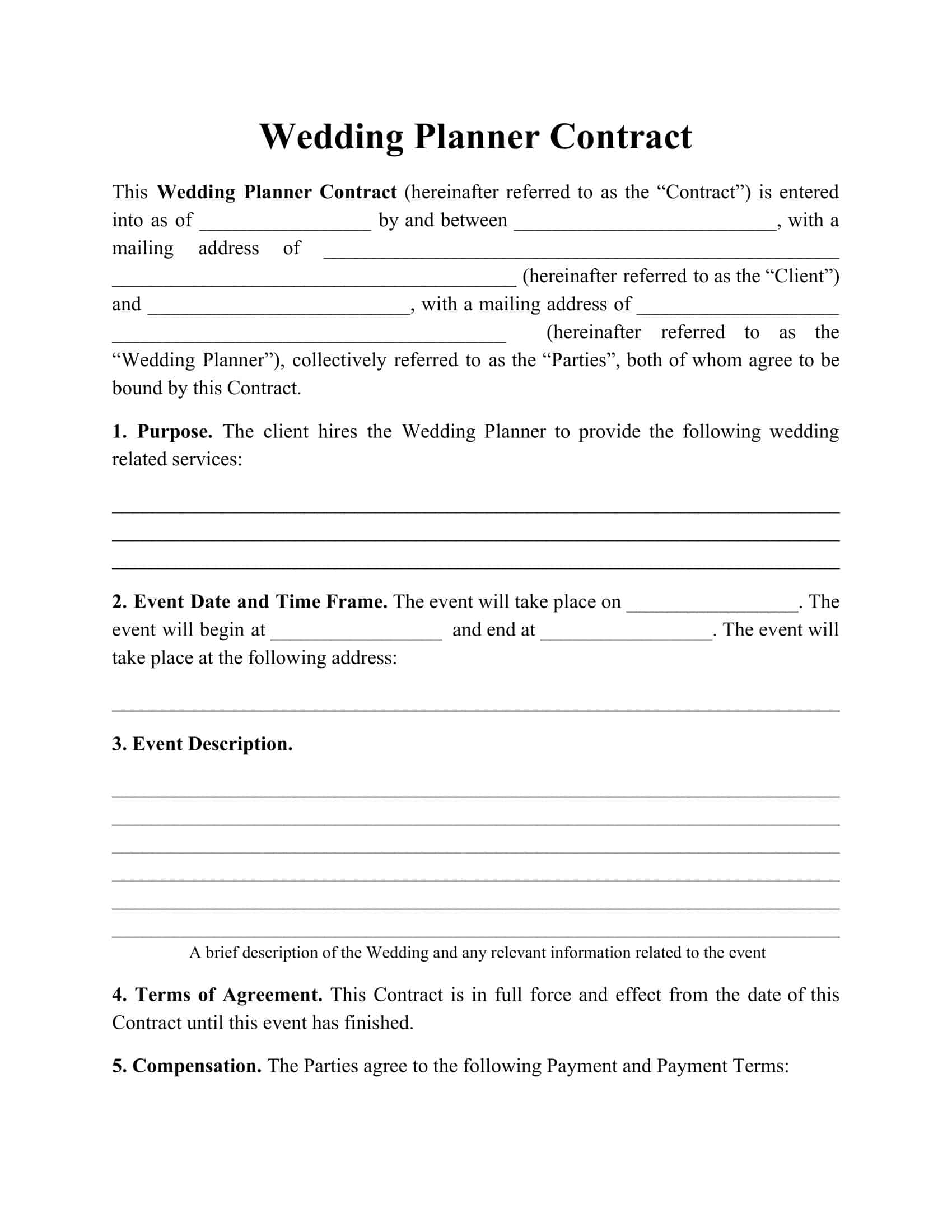







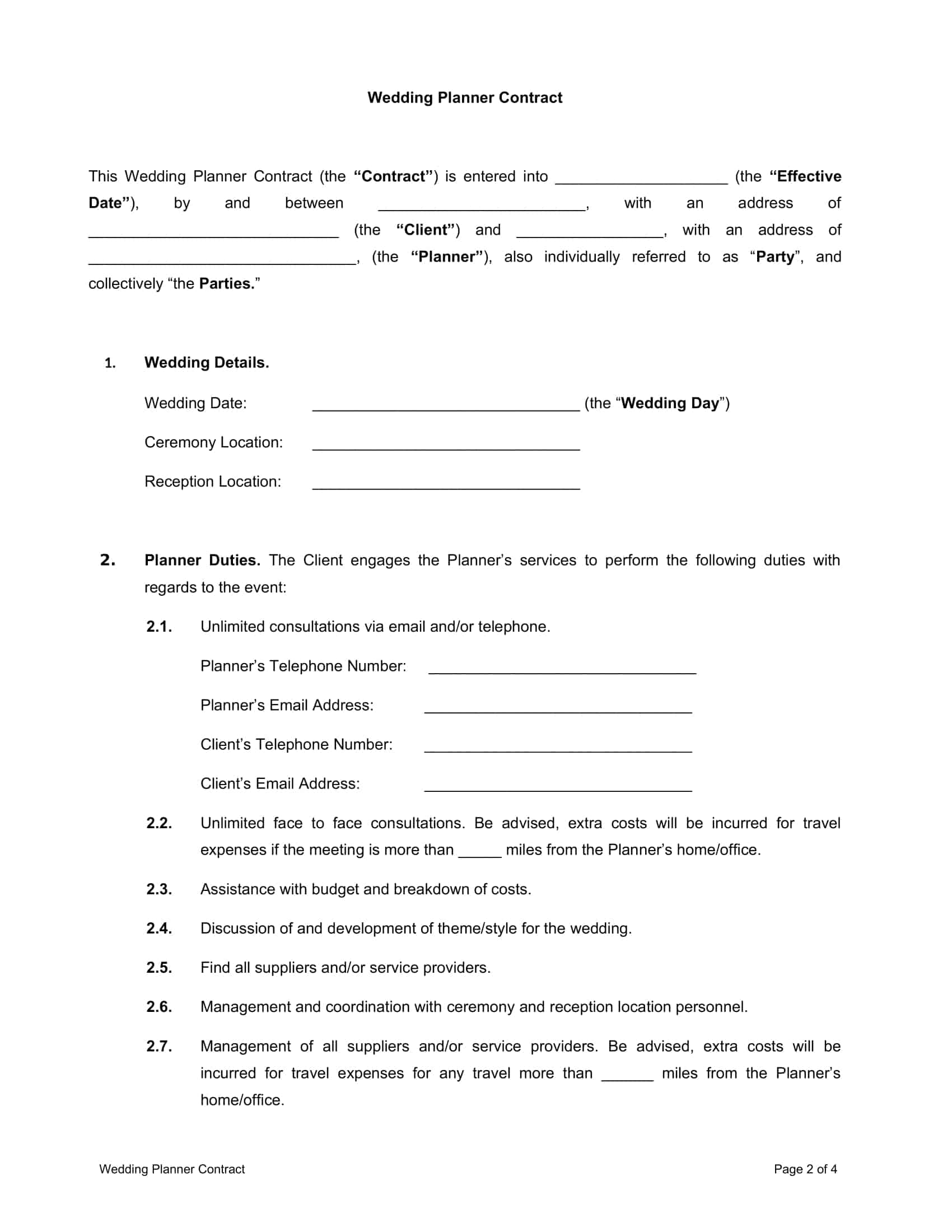

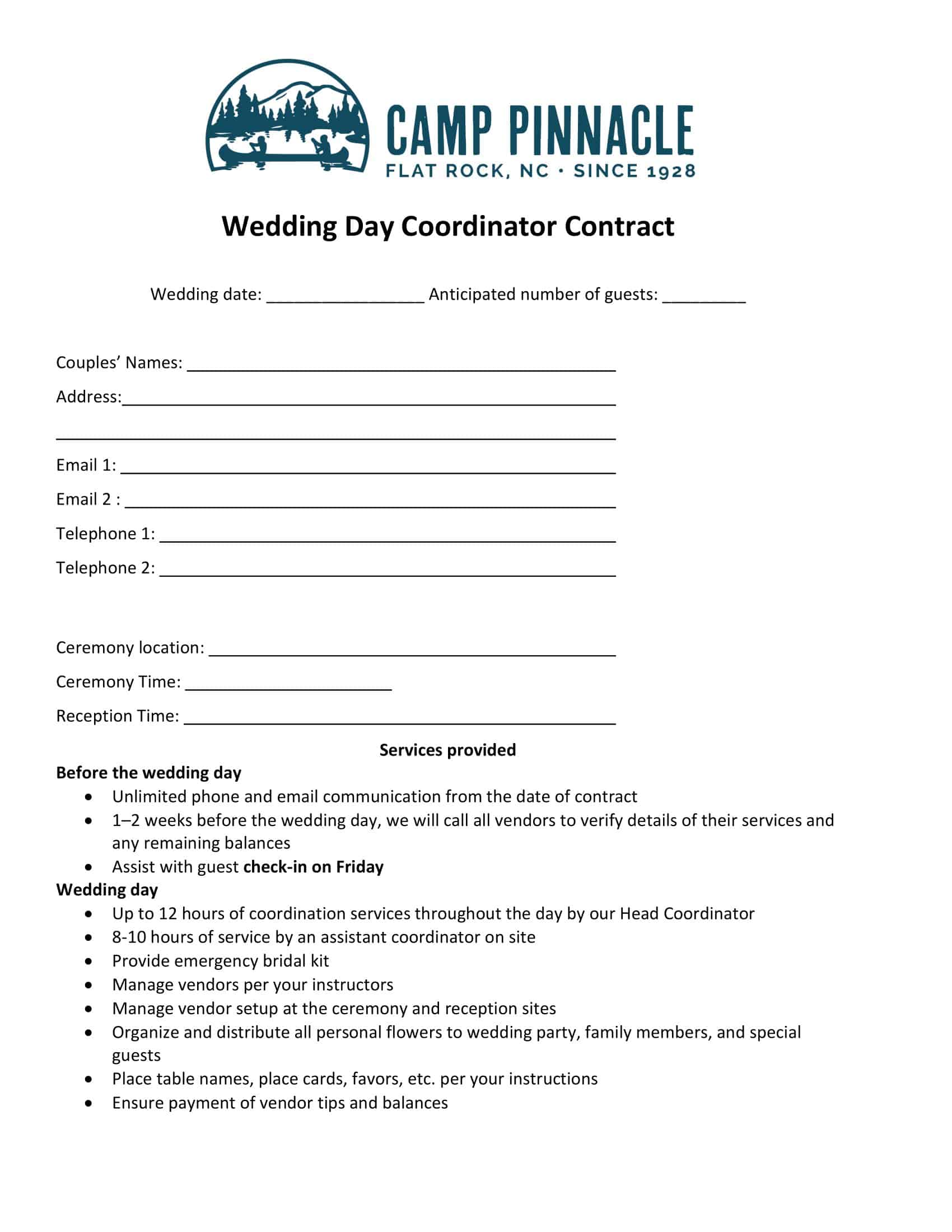



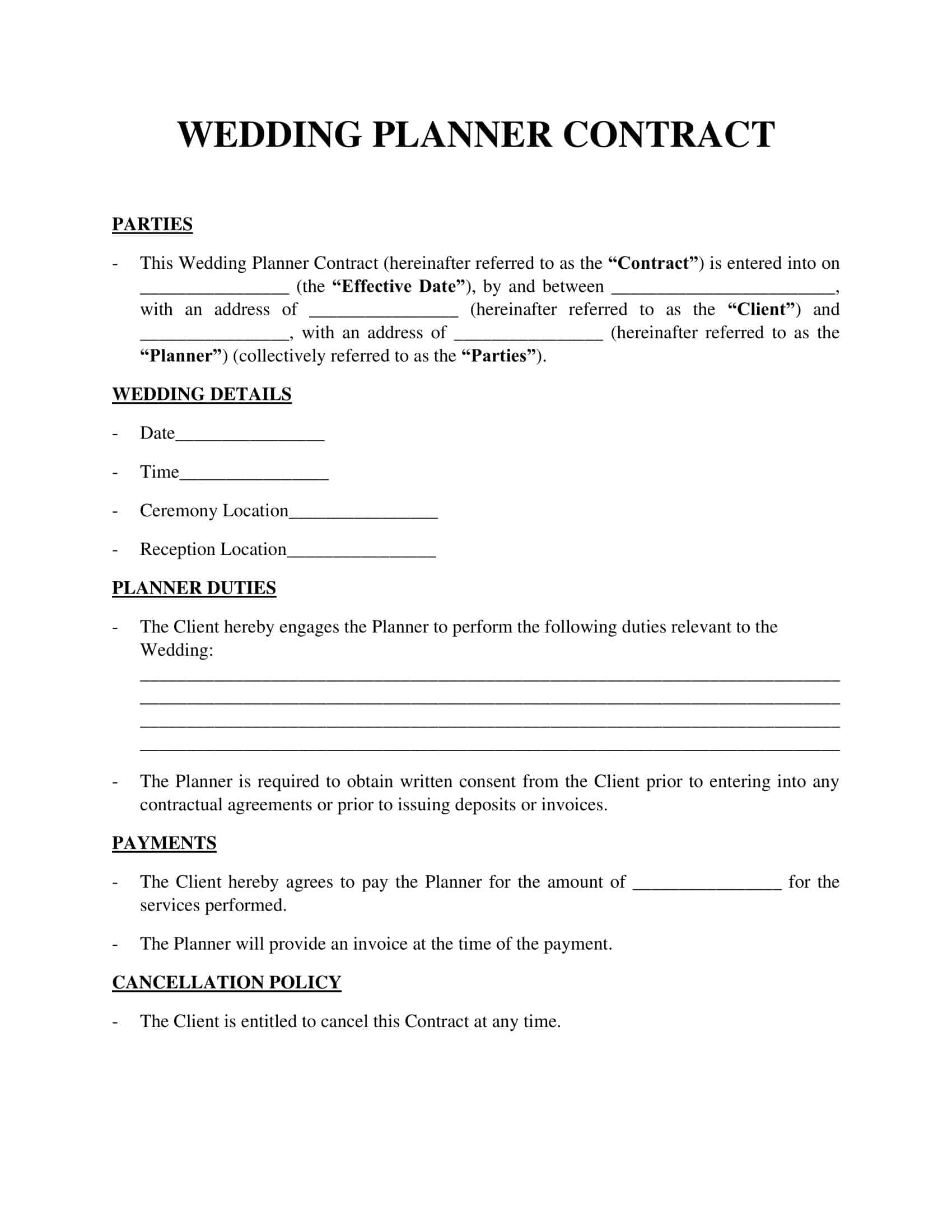

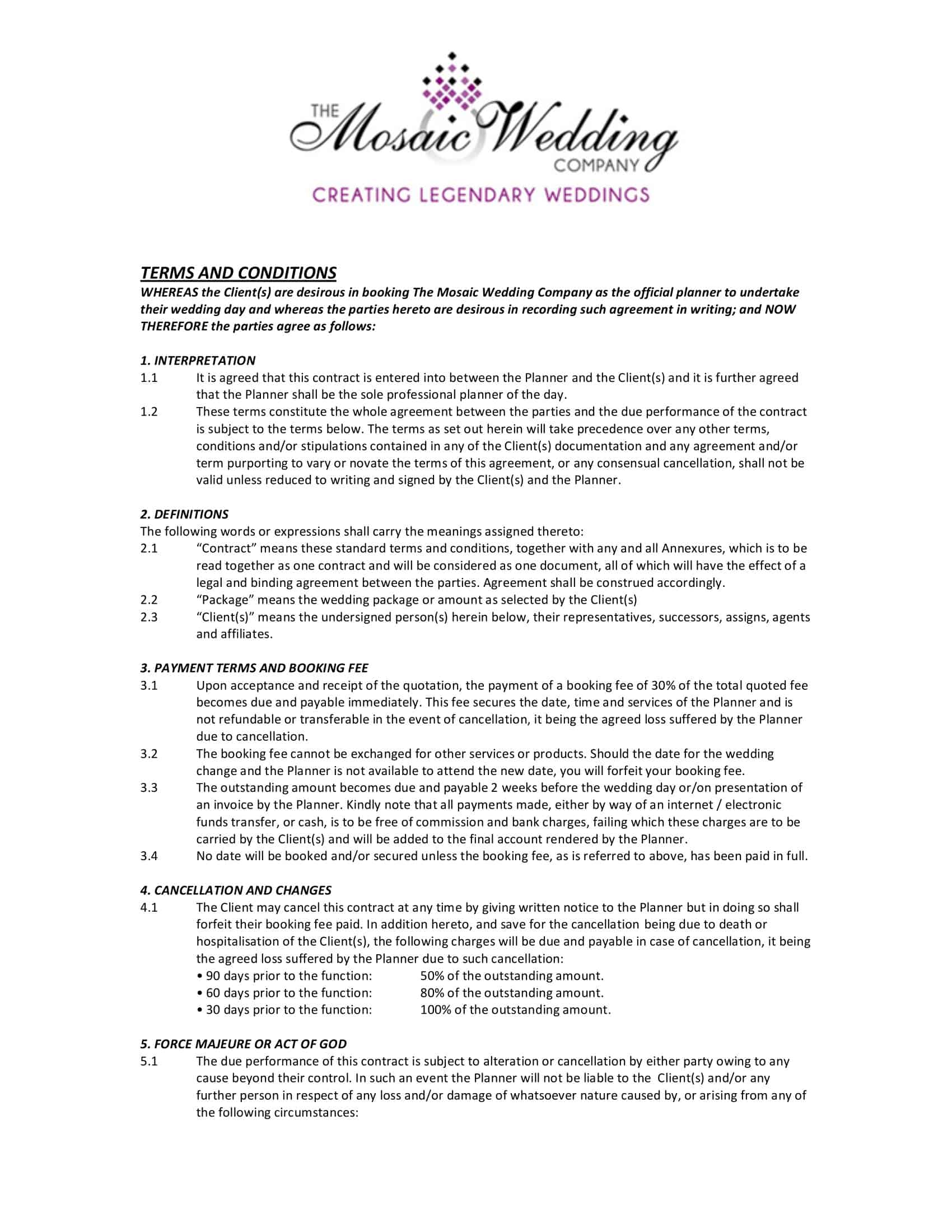





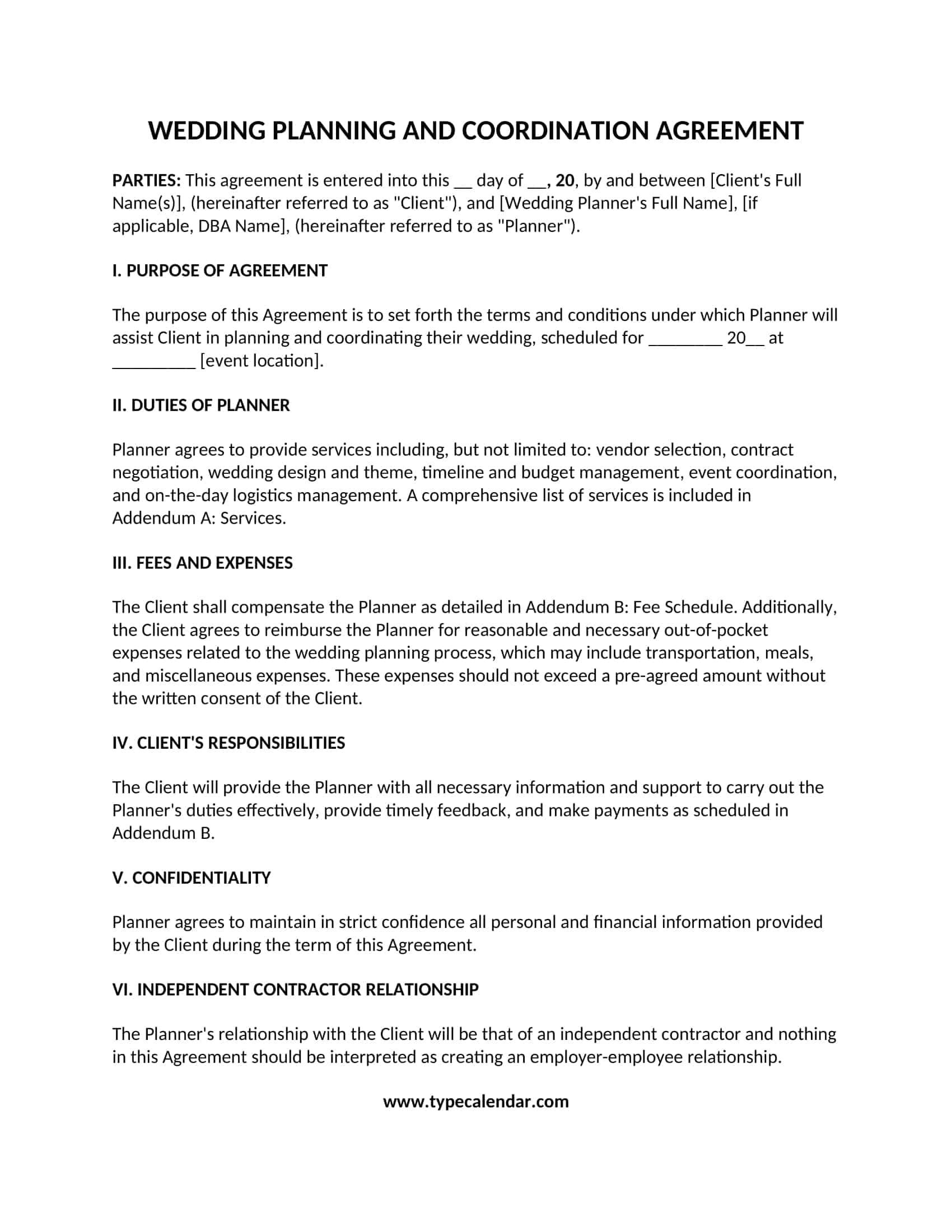
![Free Printable Roommate Agreement Templates [Word, PDF] 1 Roommate Agreement](https://www.typecalendar.com/wp-content/uploads/2023/06/Roommate-Agreement-150x150.jpg)
![Free Printable Land Contract Templates [Word, PDF] Simple 2 Land Contract](https://www.typecalendar.com/wp-content/uploads/2023/05/Land-Contract-1-150x150.jpg)
![Free Printable Catering Contract Templates [Word, PDF] Simple 3 Catering Contract](https://www.typecalendar.com/wp-content/uploads/2023/05/Catering-Contract-1-150x150.jpg)
